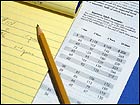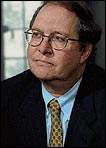|
Bill Miller plays offense
|
 |
October 22, 2001: 9:50 a.m. ET
In the weeks after the terrorist attacks, fund manager Bill Miller started buying stocks.
|
NEW YORK (CNNmoney) - Fund manager Bill Miller watched the Sept. 11 attacks on television in a hotel room in Manhattan, where he had come to have dinner with Chris Davis the night before.
But Miller, manager of the $11.2 billion Legg Mason Value Trust, was characteristically cool.
"I was not scared or nervous," he says. "My orientation toward these events is more analytical than emotional."
Miller, who spent two years as a military intelligence officer, says he learned from that experience "how to piece together information into a mosaic." One of his first priorities after the attacks was to figure out how the United States might combat the threat of terrorism. He called a friend who had worked with him in military intelligence, interviewed former Air Force Brigadier Gen. David Baker and later watched congressional testimony on terrorism by Israel's ex-prime minister Benjamin Netanyahu.
Miller's conclusion: "I'm optimistic that we will be successful in taking out the terrorists' ability to plan and execute complicated, far-reaching attacks. And that will improve our long-term economic prospects by improving our security."

|
|
|
Bill Miller | |
Miller also devoured economic analysis from some of his favorite sources, including Lyle Gramley, a former governor of the Federal Reserve Board who is now a consultant to Washington Research Group. Lisa Rapuano, Miller's director of research, was struck by how calm he was: "I was weepy, everybody was emotionally charged, but Bill was taking in information and processing it without emotion: Here are the facts, here's the basic framework, here's what we do."
By the time Miller presided over his first staff meeting at 6 p.m. on the day after the attacks, he knew he wanted to buy, and buy big, once the markets reopened.
"If you look at a chart of market returns over 60 or 70 years," he explains, "it's clear you'd want to increase your equity exposure at times of historic uncertainty, like 1932, 1940, 1973-74, 1987, 1990, 1998 and arguably right now."
In Miller's view, the economy would be hurt in the short run but then rebound sharply, in part because "the Fed is cutting rates like crazy." Miller expected the market to dive when it reopened. But, he adds, that "creates an opportunity if you have a different time horizon." So he decided "to play offense, not defense."
With virtually no spare cash to invest, Miller trimmed his stakes in companies that had held up well, like Fannie Mae (FNM: down $0.10 to $80.89, Research, Estimates) and Berkshire Hathaway, then bet the proceeds on battered stocks that "would tend to have a quicker rebound."
He loaded up on Citigroup (C: down $0.04 to $45.81, Research, Estimates) and Nextel, along with Providian, a credit-card giant that he calls "extraordinarily cheap." But as many fund managers discovered, standing firm amid a stampede of sellers was dangerous. One stock Miller snapped up in the days after the attack was AES Corp. (AES: down $0.31 to $14.01, Research, Estimates) an independent power producer that had tanked in recent months.
On Sept. 25, the day Miller flew to Virginia on his seven-seater Learjet to give a speech on the market's outlook, AES issued a warning that its profits would plunge. The next day, Miller's stake lost half its value. His response? He bought another 2.5 million shares. 
|
|
|
|
|
 |

|

